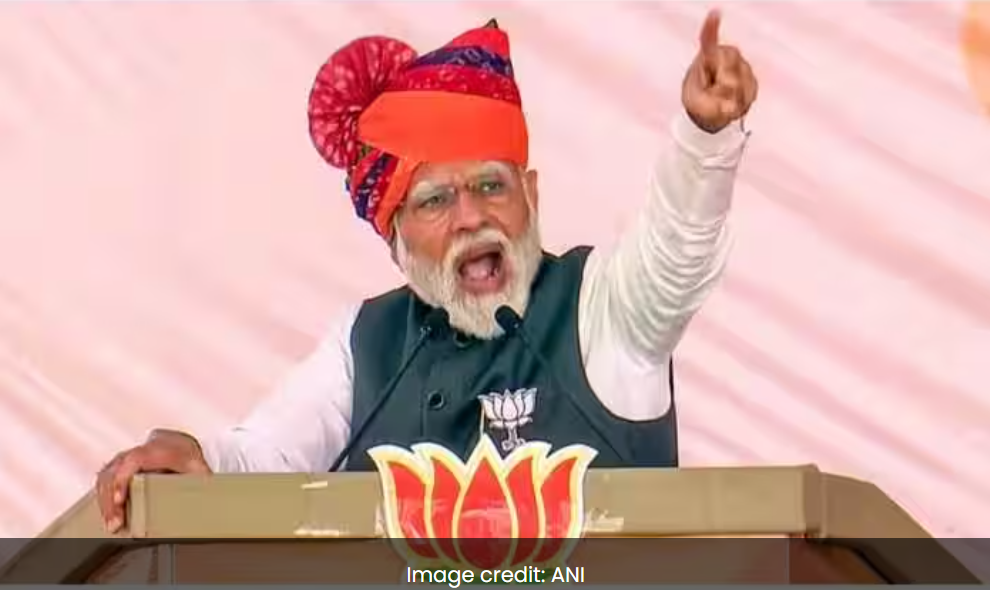Introduction:
In a recent electoral rally in Rajasthan, Prime Minister Narendra Modi employed eloquent language to cast a critical lens on the governance of Chief Minister Ashok Gehlot. The speech, characterized by rhetorical flair, brought forth key issues and challenges faced by the state. This article delves into the nuanced aspects of Prime Minister Modi’s address, exploring the political rhetoric employed and the substantive critiques levied against the Gehlot administration.

- Rhetorical Flourish: Prime Minister Modi’s use of the phrase “Jaadugar ki Jaadugari” (the magician’s magic) is emblematic of the rhetorical flourish that permeated his speech. This choice of language carries connotations of illusion and deception, signaling a strategic effort to paint the Gehlot administration’s governance as characterized by smoke and mirrors rather than tangible outcomes.
- Focused Critique on Governance: The address primarily centered on critiquing the governance model implemented by Chief Minister Gehlot. By emphasizing the need for transparency, accountability, and tangible results, Prime Minister Modi strategically positioned himself as a proponent of governance principles essential for the state’s progress. This focused critique aims to resonate with voters seeking efficient and result-oriented leadership.
- Issues and Challenges Highlighted: Through a systematic enumeration of specific issues and challenges faced by the state, Prime Minister Modi sought to underscore the inadequacies of the current administration. These ranged from economic concerns to infrastructural shortcomings, providing a comprehensive overview of the areas where the Prime Minister perceives room for improvement.
- Appeal to Voter Sentiment: The political discourse employed in the speech is tailored to resonate with the sentiment of the electorate. By aligning himself with the aspirations and concerns of the people of Rajasthan, Prime Minister Modi aims to establish a connection that transcends political affiliations. This appeal to voter sentiment is a strategic maneuver to garner support for his critique of the existing governance structure.
- Strategic Positioning for Elections: Implicit in the Prime Minister’s rhetoric is a strategic positioning for the upcoming elections. By drawing attention to perceived governance shortcomings, he sets the stage for a narrative that positions his party as the harbinger of effective, accountable governance. This positioning serves as a foundation for the party’s electoral campaign, highlighting a potential shift in leadership as a solution to the state’s challenges.
Prime Minister Modi
- Economic Vision and Development Agenda: Beyond the critique, Prime Minister Modi utilized the rally as a platform to articulate his economic vision for Rajasthan. By highlighting the imperative of a robust development agenda, he sought to present an alternative path that aligns with the economic aspirations of the state. This forward-looking narrative underscores the importance of a comprehensive approach to governance that not only identifies shortcomings but also outlines a roadmap for progress.
- Historical Context and Comparative Governance: The speech subtly wove in historical context and a comparative analysis of governance. Drawing comparisons between the current administration and historical benchmarks, Prime Minister Modi sought to underscore the need for a governance paradigm rooted in successful precedents. This comparative framework aims to influence voter perception by framing the discussion within a broader historical and contextual lens.
- Focus on Rural Development: Another significant facet of Prime Minister Modi’s discourse was a pronounced emphasis on rural development. By highlighting the challenges faced by rural communities and presenting his party’s commitment to addressing these issues, the Prime Minister aimed to resonate with a diverse electorate. The focus on rural development aligns with the broader narrative of inclusive governance, appealing to a wide spectrum of voters.
- Response to Counterarguments: As a seasoned orator, Prime Minister Modi preemptively addressed potential counterarguments. By acknowledging the political landscape’s complexity and the existence of diverse perspectives, he positioned his critique as a constructive contribution to the democratic discourse. This tactic seeks to fortify the narrative against potential detractors and portrays a statesmanlike approach to political debate.
- Media and Public Perception: The impact of such speeches extends beyond the physical rally, permeating into media coverage and public perception. Assessing how the address is reported in the media and its subsequent influence on public sentiment is integral to understanding the speech’s broader implications. The framing of the narrative in subsequent news cycles and public discourse will play a pivotal role in shaping the aftermath of the Prime Minister’s critique.
- Potential Political Ramifications: The nuanced political critique and strategic positioning in this speech carry potential ramifications for the political landscape in Rajasthan. How voters interpret and respond to the Prime Minister’s message could significantly influence the electoral dynamics. Additionally, the speech may set the tone for subsequent political discourse, shaping the narratives of both major parties as the election season progresses.
In conclusion:
Prime Minister Modi’s address in the Rajasthan election rally transcends mere political rhetoric, offering a multifaceted analysis of governance, economic vision, and historical context. As the political landscape continues to evolve, the lasting impact of this speech on voter sentiment, media coverage, and the electoral outcome will be closely monitored, making it a pivotal moment in the unfolding narrative of the state’s political landscape